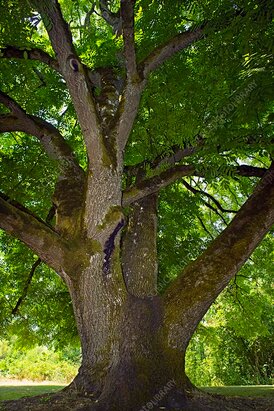Black Walnut
Common name: Black Walnut
Scientific Name: Juglans nigra
Where does it grow: Eastern United States
How tall does the tree grow: 100 to 120 feet
Tree trunk diameter: 2 to 3 feet
Color of lumber: Heartwood ranges from medium to dark chocolate brown, with darker brown streaks. Sapwood is pale yellow-gray to nearly white.
Grain: Usually straight, but can be irregular and knotty
Janka Hardness: 1010 (not all that hard but definitely not soft)
Cost: $11.25 a board foot (Dec 1, 2021)
Notes: Black walnut is very popular among woodworkers due to its beautiful color and high luster when finished. Unusual grain patterns in burls and crotch pieces are particularly prized and become focal points in artwork. While any wood has the potential to irritate a woodworker’s skin, eyes and throat, some people can be definitely be sensitive to working with black walnut (SO ALWAYS WEAR A MASK WHEN IN YOUR SHOP AND HAVE A GOOD PLAN FOR DUST COLLECTION AND AIR FILTRATION). In nature, black walnut is toxic to other plants (a mature tree produces a substance called juglone in its roots that kills neighboring trees).
Scientific Name: Juglans nigra
Where does it grow: Eastern United States
How tall does the tree grow: 100 to 120 feet
Tree trunk diameter: 2 to 3 feet
Color of lumber: Heartwood ranges from medium to dark chocolate brown, with darker brown streaks. Sapwood is pale yellow-gray to nearly white.
Grain: Usually straight, but can be irregular and knotty
Janka Hardness: 1010 (not all that hard but definitely not soft)
Cost: $11.25 a board foot (Dec 1, 2021)
Notes: Black walnut is very popular among woodworkers due to its beautiful color and high luster when finished. Unusual grain patterns in burls and crotch pieces are particularly prized and become focal points in artwork. While any wood has the potential to irritate a woodworker’s skin, eyes and throat, some people can be definitely be sensitive to working with black walnut (SO ALWAYS WEAR A MASK WHEN IN YOUR SHOP AND HAVE A GOOD PLAN FOR DUST COLLECTION AND AIR FILTRATION). In nature, black walnut is toxic to other plants (a mature tree produces a substance called juglone in its roots that kills neighboring trees).

